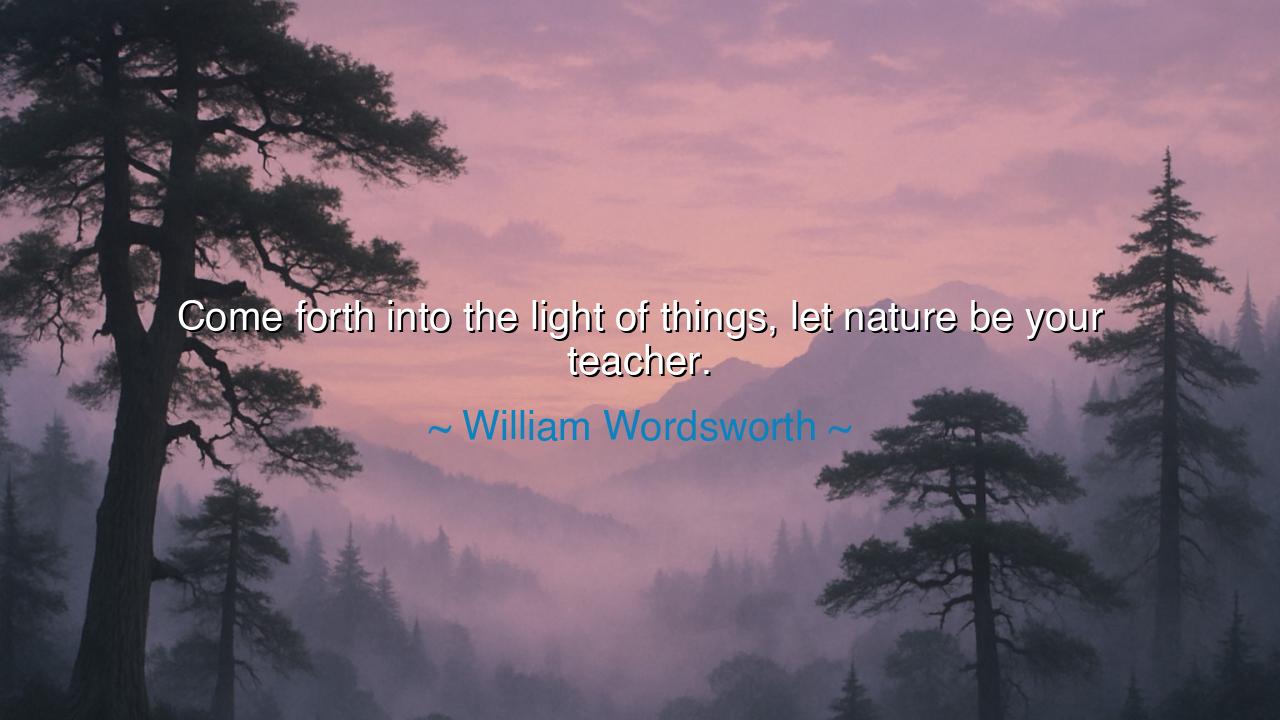
Come forth into the light of things, let nature be your teacher.






William Wordsworth, the great poet of the Romantic age, once proclaimed: “Come forth into the light of things, let nature be your teacher.” In this radiant command, he calls not only his contemporaries but all generations to leave behind the prisons of narrow thought and the dark confusions of human vanity, and to step into the clear and eternal wisdom that only nature provides. For in the light of things—in the rivers, mountains, forests, and skies—there is a truth more ancient than books, more enduring than empires, and more healing than all the philosophies of men.
The origin of these words rests in Wordsworth’s own life. Living in the English Lake District, walking daily among hills and streams, he found in nature not a backdrop, but a living presence. To him, the fields and valleys were not dumb scenery but companions and guides, whispering to the soul lessons of simplicity, humility, and joy. His poetry, especially in Lyrical Ballads and The Prelude, is filled with this conviction: that to dwell in nature is to dwell in truth, and that to look upon the ordinary flower or stone is to see a spark of the divine.
The ancients, too, bowed before this wisdom. In Greece, philosophers taught beneath trees and in open air, believing that the breath of the wind sharpened the mind. In China, sages like Laozi and Zhuangzi taught that harmony with the Tao could be found by watching the effortless flowing of water and the bending of grass before the storm. Everywhere, when man has been wise, he has turned to nature as his teacher, for she instructs without pride and speaks without falsehood.
History offers us striking examples of those who obeyed this call. Consider the young Charles Darwin, who voyaged upon the HMS Beagle and, in watching finches, tortoises, and corals, uncovered truths that would reshape science forever. It was not in laboratories alone but in the open light of things that revelation came. Or think of Saint Francis of Assisi, who walked among birds and beasts, calling them his brothers and sisters, and from them learned the humility and joy that made him one of the world’s most beloved saints. Both men, though worlds apart, walked the same path Wordsworth urged: they let nature be their teacher.
The meaning of this quote is both gentle and revolutionary. Wordsworth is not simply urging us to take walks or admire scenery. He is commanding us to recover the childlike openness that allows nature to instruct the heart. The mountain teaches endurance, the river teaches persistence, the tree teaches patience, the dawn teaches renewal. All around us are sermons without words, waiting for those with eyes to see and ears to hear. But too often, blinded by distraction, man refuses to learn from the very world that sustains him.
The lesson, then, is clear: if you wish to grow in wisdom, if you wish to quiet the storms of your soul, if you wish to live in truth, then step outside—come forth into the light of things. Walk without hurry, observe without prejudice, and let nature be your teacher. Do not look upon the flower as “mere decoration,” but as a lesson in beauty and fragility. Do not look upon the forest as “timber,” but as a living cathedral of patience and unity. Do not despise the humble bird, for it teaches freedom and song even in hardship.
Practically, this means we must create space in our lives for nature—not as luxury, but as necessity. Spend time daily beneath the sky, even if only a few moments. Learn to listen to the wind and to watch the rhythms of the seasons. Bring children into the fields and mountains, teaching them that wisdom is not only written in books but in the shapes of clouds and the flowing of streams. In this way, the human soul, so often hardened, may be softened again by the touch of the eternal.
Thus Wordsworth’s words endure, not as poetry only, but as commandment: “Come forth into the light of things, let nature be your teacher.” They summon us to humility, to joy, to reverence, to renewal. For in nature’s classroom there is no end to the lessons, and every dawn is a page waiting to be read by those who still have eyes to see.






AAdministratorAdministrator
Welcome, honored guests. Please leave a comment, we will respond soon